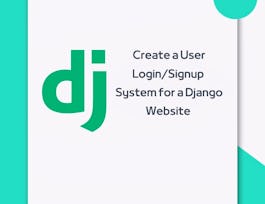In this course, you will learn how Django communicates with a database through model objects. You will explore Object-Relational Mapping (ORM) for database access and how Django models implement this pattern. We will review the Object-Oriented (OO) pattern in Python. You will learn basic Structured Query Language (SQL) and database modeling, including one-to-many and many-to-many relationships and how they work in both the SQL and Django models. You will learn how to use the Django console and scripts to work with your application objects interactively.


Building Web Applications in Django
This course is part of Django for Everybody Specialization
Taught in English
Some content may not be translated

Instructor: Charles Russell Severance
48,386 already enrolled
Included with 
Course
(740 reviews)
97%
What you'll learn
Describe and build a data model in Django
Apply Django model query and template tags/code of Django Template Language (DTL)
Define Class, Instance, Method
Build forms in HTML
Skills you'll gain
Details to know

Add to your LinkedIn profile
8 quizzes
Course
(740 reviews)
97%
See how employees at top companies are mastering in-demand skills

Build your subject-matter expertise
- Learn new concepts from industry experts
- Gain a foundational understanding of a subject or tool
- Develop job-relevant skills with hands-on projects
- Earn a shareable career certificate


Earn a career certificate
Add this credential to your LinkedIn profile, resume, or CV
Share it on social media and in your performance review

There are 4 modules in this course
This section explores how we define models in Django and then we build the data models and explore the administration interface for our application. Data models are how Django interacts with the underlying database to store and retrieve data.
What's included
8 videos4 readings2 quizzes1 app item
Views are the aspect of Django applications that produce the web pages that are shown to our users. Views are one of several core elements of Django applications.
What's included
9 videos1 reading2 quizzes1 app item
We review Python Object Orientation and look at the generic views capability within Django. We use generic views by extending Django classes to make a new view class.
What's included
7 videos2 readings2 quizzes
We cover how GET and POST work, how forms are constructed from HTML, how we protect our applications against Cross-Site Scripting Forgery (CSRF), and how we handle browser refreshes after POST.
What's included
8 videos3 readings2 quizzes1 app item
Instructor

Offered by
Recommended if you're interested in Mobile and Web Development

University of Michigan

University of Michigan

University of Michigan

Coursera Project Network
Why people choose Coursera for their career




Learner reviews
Showing 3 of 740
740 reviews
- 5 stars
79.45%
- 4 stars
13.91%
- 3 stars
3.91%
- 2 stars
1.21%
- 1 star
1.48%
New to Mobile and Web Development? Start here.

Open new doors with Coursera Plus
Unlimited access to 7,000+ world-class courses, hands-on projects, and job-ready certificate programs - all included in your subscription
Advance your career with an online degree
Earn a degree from world-class universities - 100% online
Join over 3,400 global companies that choose Coursera for Business
Upskill your employees to excel in the digital economy
Frequently asked questions
Access to lectures and assignments depends on your type of enrollment. If you take a course in audit mode, you will be able to see most course materials for free. To access graded assignments and to earn a Certificate, you will need to purchase the Certificate experience, during or after your audit. If you don't see the audit option:
The course may not offer an audit option. You can try a Free Trial instead, or apply for Financial Aid.
The course may offer 'Full Course, No Certificate' instead. This option lets you see all course materials, submit required assessments, and get a final grade. This also means that you will not be able to purchase a Certificate experience.
When you enroll in the course, you get access to all of the courses in the Specialization, and you earn a certificate when you complete the work. Your electronic Certificate will be added to your Accomplishments page - from there, you can print your Certificate or add it to your LinkedIn profile. If you only want to read and view the course content, you can audit the course for free.
If you subscribed, you get a 7-day free trial during which you can cancel at no penalty. After that, we don’t give refunds, but you can cancel your subscription at any time. See our full refund policy.

